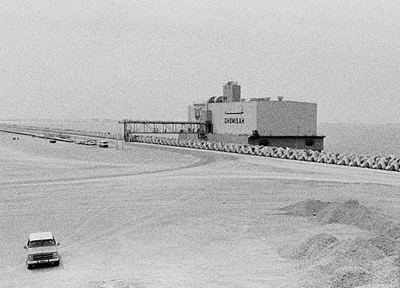We are hurt badly by the oil price increases of the last decade, but the real victims are the peoples of the richest OPEC states – Saudi Arabia, the United Arab Emirates, Kuwait, Libya.
While the Industrial world suffers from high unemployment, soaring inflation and decreasing economic growth, the oil exporters face the prospect of total destruction.
This prospect is all the more dangerous for being well hidden. By any economic standards, the great oil exporters are prospering. Regions that a generation ago were among the most isolated, poor and backward are today among the richest and most powerful. Undreamed-of wealth has made possible the benefits of modern civilization, including its medicine, learning, technology, culture and military might.
But these benefits have a price. A close look at the richest oil states shows that massive influx of money endanger their stability, possibly their very existence.
Two problems pose the greatest threat: disruption and dependence.
Disruption of traditional ways of life occurs all over the world, but nowhere with such suddenness and drama as in the instant-millionaire states. The social relations, political structures and religious truths of old are under pressure; traditional skills are virtually useless. Who needs camel drivers or hand weavers? The old mercantile, religious and tribal elite has been overtaken by a new group with connections to oil-agents, traders, technicians. Almost everything familiar has been replaced by distressingly new forms.
Dependence on the outside world makes the oil states terribly vulnerable. Before oil was discovered, these primitive countries lived largely outside the world economy, growing their own food, producing their own goods, providing their own services. Now they get all these from the outside world. Wealth derives from payments for oil: Food and manufactured items come from abroad, as do the workers at all levels, from water-carriers to oil-refinery technicians. Foreigners staff the universities and even many armies.
Water problems illustrate the dangers of disruption and dependence. Because the richest oil states have either desert or semi-arid climates, their populations formerly subsisted on small quantities of water. This came from underground reserves supplemented by occasional but unpredictable rainfall. Life in the desert revolved around the supply of water; its volume and quality determined pasturage, agricultures and travel. The digging of wells preoccupied the inhabitants and disputes over water rights caused most of their conflicts. Bedouin either lived in careful harmony with their water supplies or they perished.
Oil revenues abruptly upset this balance. New wealth provided funds for machinery to dig deeper wells and to distribute water across great distances. Locals abandoned their frugal habits and the hordes of foreigners who took up residence consumed water as lavishly as they did in their American or European homelands. Large-scale agricultural and animal-breeding projects required huge amounts of water – and the cement for big construction projects even more.
 A desalination plant in Saudi Arabia. |
In fact, the crisis has only been delayed. Desalination plants are delicate, expensive and technically complex; their operations can easily be disrupted. Civil unrest could force foreign technicians, who keep the plants running, to flee; a rebel group could capture the plants and stop pumping water; terrorists could sabotage them; enemy aircraft could bomb them; war could prevent spare parts or fuel from reaching them; industrial states could impose an embargo on spare parts; or oil revenues might decline so precipitously that the costs of desalination cannot be met.
Any of these developments would cut off the source of fresh water for millions. Whole cities would find themselves dry. Emergency supplies could be brought in, but not for long; a city like Riyadh, Saudi Arabia, now with a population over a half million, would become an overnight ghost town.
A water disaster is just one of many possible paths to destruction. The oil price stampede is a true tragedy, for it harms not just those of us who are paying out so much, but even more those who appear to profit from it. Before too long, it will be seen as one of the great calamities of our century. We have yet to witness its full impact.
Daniel Pipes, a specialist in Middle East and Islamic affairs at the University of Chicago, is author of two forthcoming books, Slave Soldiers and Islam and Egyptian Colloquial for Students of Arabic.